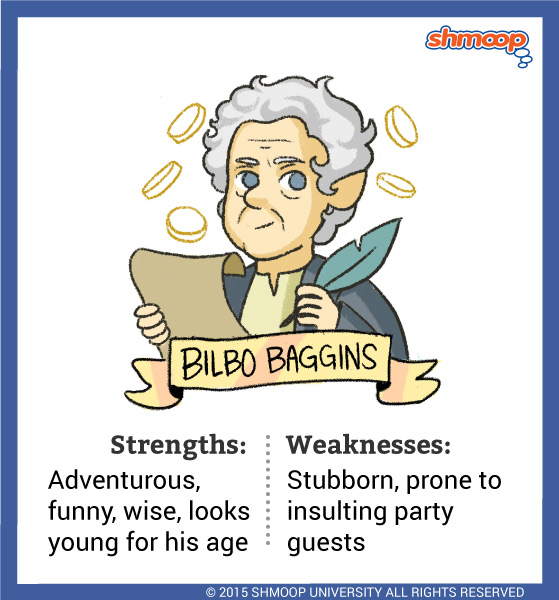Character Analysis

(Click the character infographic to download.)
When last we saw Bilbo in Tolkien's The Hobbit, he was a poetry-reciting burglar, a friend to Dwarves and Wizards, and just a bit out of place in the pleasant but boring Shire. When we meet Bilbo again at the beginning of The Fellowship of the Ring, he's pretty much the same guy – funny, wise, and experienced in the world of adventure – but even more out-of-his-mind-with-boredom living in the Shire.
In fact, Bilbo is almost exactly the same guy he was sixty years before the start of this book, when he originally returned from his first round of adventures with the Dwarves at Lonely Mountain. He looks mostly the same, even though he is now over a hundred years old. Clearly, something is wrong with Bilbo. It's unnatural not to age at all, no matter how nice a Hobbit you are.
Of course, as we find out pretty quickly, the reason for Bilbo's surprising preservation is his evil, ancient Ring, which he has been holding on to as a harmless keepsake of his journey and a handy tool to avoid meetings with people he doesn't want to see. Poor Bilbo has no idea of the extent of the Ring's power or evil (or else he certainly would not have left it to his nephew and heir, our hero Frodo Baggins).
With Gandalf's help, Bilbo gives up the Ring before going on his long journey to Rivendell. But Bilbo really, really doesn't want to. It takes all of his and Gandalf's combined mental strength to get him to let the Ring go. The fact that kindly, generous Bilbo has so much trouble giving up the Ring foreshadows Frodo's own, much worse difficulties with this terrible object. But Bilbo also gives us hope that a person can carry the Ring and survive its damage. He's both a good and bad model for Frodo to follow.
The Hobbit
Bilbo's role in the Lord of the Rings series is to provide a strong sense of continuity between The Hobbit and The Fellowship of the Ring. They are part of the same storytelling universe, after all, even if the tone of the two novels is completely different. Everything that Bilbo learns on his journey, he passes on to Frodo. So when Frodo starts his own heroic quest, he doesn't have to start from scratch and reinvent the wheel. He already knows Elvish and old lore. Frodo gets a head start on his quest as the almost-son of the first modern Hobbit adventure.
Bilbo also provides inspiration for Frodo and the other Hobbits on his quest. When Frodo finds himself in the Barrow-downs facing off against evil ghosts, he remembers Bilbo:
But though [Frodo's] fear was so great that it seemed to be part of the very darkness that was round him, he found himself as he lay thinking about Bilbo Baggins and his stories, of their jogging along together in the lanes of the Shire and talking about roads and adventures. (1.8.31)
At the start of the Ring Quest, poor Frodo jumps straight into the deep end, adventure-wise. He is struggling to save the lives of his friends against an evil spirit trying to kill them in an old tomb. What gets him through the absolute terror is the thought of his uncle. Nothing else in Frodo's life has prepared him for life on the open road. It's Bilbo's example that reminds Frodo that, yes, Hobbits can also do great things in the world.
Bilbo Baggins, Author
In our learning guide on The Hobbit, we talk about some of the similarities between Bilbo Baggins, character, and J.R.R. Tolkien, author. Those likenesses between character and author seem a bit less obvious by the time we get to The Fellowship of the Ring. Still, we think it's important to remember that Bilbo, himself, is a writer.
When Frodo arrives in Rivendell, Bilbo jumps the opportunity to "take notes of Frodo's adventures" (2.3.49) to add to his own adventures in what will become the Red Book of Westmarch. The fact that Bilbo is writing the book of the War of the Rings as it is happening means that he can propose several endings: first, "and he [Bilbo] lived happily ever after to the end of his days" (1.1.80) and then, "and they all settled down and lived together happily ever after" (2.3.21). Both these endings sound great to us.
The thing is, they are final sentences for a different, lighthearted kind of story. These lines are how fairy tales for children end, without complexity or sacrifice or compromise. Since the Lord of the Rings series is a more serious and ambitious work than The Hobbit, we strongly suspect that the ending is going to be more painful than what Bilbo predicts.